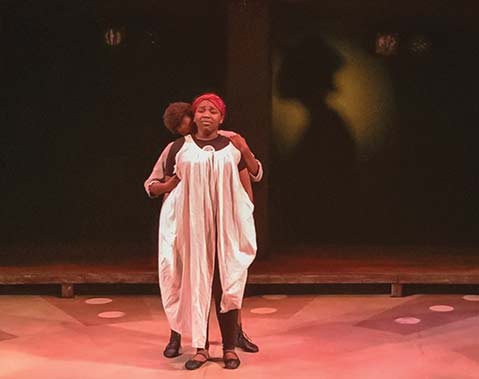‘Venus’ at UCSB November 6-14
Department of Theater and Dance Opens Season with Suzan-Lori Parks’s Work

UCSB kicks off the 2015-2016 academic year with Suzan-Lori Parks’s Venus, the Obie-winning play about the exploitive sexualization of Sarah Baartman, a sideshow performer known as the Hottentot Venus. Directed by Tom Whitaker, Parks’s work reinvents the life and adventures of Baartman, a South African woman sold into the European sideshow circuit in the early 19th century. Venus’s full figure (a probable case of steatopygia, a genetic quality in which women develop substantial gluteal tissue, resulting in a curvy physique uncommon to women of European decent) earns her a degree of fame throughout Europe as a living curio. Shown through the degrading quality of human trafficking (Baartman sold to the sideshow) and the subsequent objectification of Baartman’s unusual-looking body, Venus examines some of the many damaging effects of imperialism and the commoditization of colonized populations.
Venus’s “act” in the sideshow consists mostly of displaying her exotic features, including her buttocks and genitals, for the purpose of entertaining attraction attendees. Her unusual physical traits garner wide interest from the public, and Venus is paraded before fascinated audiences from all over Europe. Venus’s popularity brings her a heightened sense of worth, but the objectification of her physical form seals her fate as a subject for constant examination and study. The Baron Docteur, a European doctor of means, purchases Venus as a mistress, though his true intent is to study her body post-mortem. Venus accompanies the Baron Docteur to Paris as a lover and contracts gonorrhea from him. Knowing her condition, he denies Venus treatment for the malady and instead conspires to have her jailed until her death, when he can collect the body for his intended analysis. While not a historically accurate portrayal of the genuine Baartman’s life, Parks’s work is a provocative look at the degrading practices of slavery and human ownership, the perverse thrill of infamy, and the gross objectification of women in the colonial era (especially women of color).
While Parks’s drama is certainly driven by the contrast between Venus the person and Venus the object of fascination, Parks’s Baartman is not necessarily written as a repressed character who embodies victimization. The suggestion of Venus’s implicit involvement in her captive lifestyle insinuates that this complex character is, among other things, subtly opportunistic despite her limited control over her situation. Venus isn’t merely a play that scrutinizes society’s obsession with “the outsider” or “the other”; it’s the story of a woman’s rise to and fall from fame within an alien culture. While Venus has little choice in most of her life decisions due to her position as property of the sideshow, she uses what influence she has to maintain her celebrity. Venus’s stardom is a point of leverage — and, ultimately, the key to her ruin.
Featuring UCSB undergraduate student performers and live music directed by the UCSB Jazz Ensemble’s Jon Nathan, this fictionalized account of Baartman’s experiences as the Hottentot Venus portrays the racism, sexism, and objectification common in the colonial era and challenges audiences with unfettered views of celebrity, survival, and the portrayal of sex and the human form as oddity commodities.
4.1.1
Presented by the UCSB Department of Theater and Dance, Venus runs Friday, November 6-Saturday, November 14, at UCSB’s Performing Arts Theater. For tickets and information, call (805) 893-2064 or see theaterdance.ucsb.edu.



